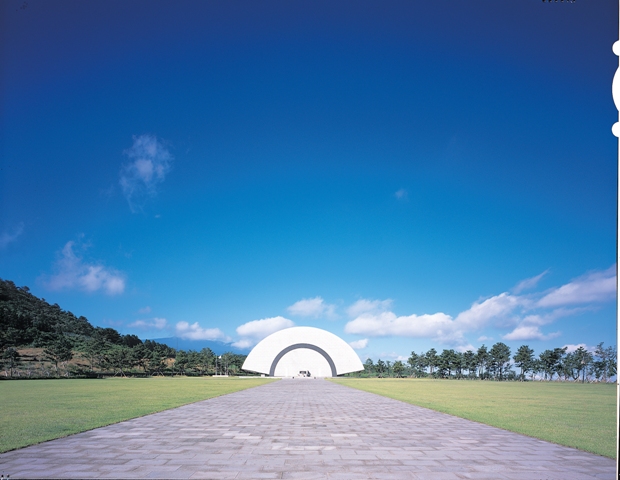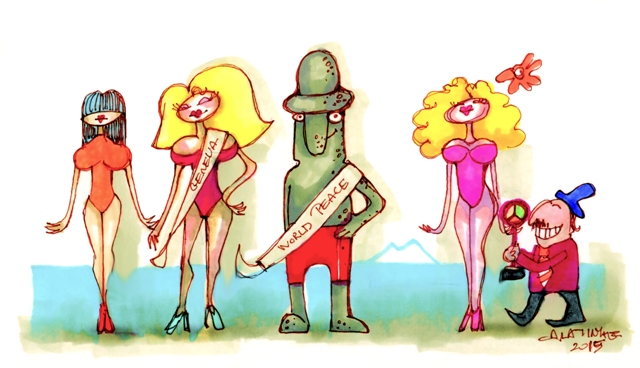| |
 |
|
| ▲ All Souls' Altar at Jeju Peace Park. Photo courtesy Jeju Peace Park |
Jeju boasts many impressive titles, such as Special Self-Governing Province, Free International City and the first UNESCO Triple Crown holder. Given the list, it is understandable that Jeju, with its beautiful natural scenery, is a special economic zone.
This tiny island has an additional name, though, “The Island of World Peace.”
You are likely familiar with other peace cities such as Geneva, Oslo and the Hague, but if Jeju really is an island of world peace, how can we judge its progress in that direction?
The title can be traced back to a 1991 summit in Jeju between Mikhail Gorbachev, the former Soviet president, and Roh Tae-Woo, former South Korean president.
Other world leaders have also visited the island for summits, making the island more and more like Geneva. These include former US president Bill Clinton, former South Korean presidents Kim Young Sam and Roh Moo-Hyun, and also former Japanese prime minister Junichiro Koizumi.
The concept behind the “Island of World Peace” is thus inspired by Jeju as a place where political leaders gather to share ideas on security, conflict resolution and avenues toward world peace.
While Jeju Free International City was ambitiously promoted, the concept of the Island of World Peace was legislated by the Jeju Free International City Special Act.
A couple of years later, Jeju was officially designated and declared an Island of World Peace in January, 2005, and after 10 years Jeju has engaged in 17 projects and programs to realize its goal.
Achievements include the Jeju Peace Institute, which manages its own international and peace-related projects, and the Jeju Peace Center, providing educational programs.
Arguably most well known, however, is the Jeju Forum for Peace and Prosperity, which has helped Jeju strengthen its peace-promoting brand since its inauguration in 2001. Inviting various world political leaders, it has been hosted 10 times and is increasingly globally recognized.
In marking the anniversary in January, Jeju governor Won Hee-ryong was clear that the next 12 months would be critical for regional peace with more international exchange in culture, the arts, and humanity.
| |
 |
|
| ▲ Jeju up for the top prize in a global peace pageant. Picture by Agne Latinyte |
This hints that Jeju is going to expand the scope of its international exchange from tourism to the environment, education, culture and academia. The province will also be continuing to expand its visibility in the international arena, particularly through its Official Development Assistance to countries such as Nepal, East Timor and Vietnam.
As an “Island of World Peace,’ Jeju is even actively promoting the “Jeju Peace Process” to resolve the strained relationship between the two Koreas. The full resumption of sending citrus to North Korea is essential for this, and Governor Won has also invited a North Korean delegation to this year's Jeju Forum.
Establishing a tourism and environmental partnership could be an effective approach to resolution, such as opening a cruise line between Jeju and North Korea, or a coordinated environmental project.
Won also spoke of his hopes for exchange in culture and the arts, with Jeju being selected as an exemplar for Korea-China exchange. China is crucial in terms of Jeju investment and tourism, but it is also essential to have meaningful interpersonal exchanges to build deep friendships.
The relationship between Jeju and China is long and well documented. The first king to unite China, Qin Shi Huang (260-210 BCE), sent a special envoy, Xu Fu, to Jeju to find the elixir of immortality. Such exchanges between the regions have thus been active for over 2,000 years.
Qin Shi Huang is the first emperor of China and achieved many historical firsts, including constructing the first one thousand “li” of the Great Wall. The wall itself provided protection from enemies, but despite being a great accomplishment it was also inherently limiting.
As the Won Hee-ryong administration declares 2015 a critical year for exchange in culture and the arts, Jeju is expanding connections with not only China but the world.
The declaration is clearly not a wall to keep people out, but rather a special envoy seeking beneficial exchange and even, one day, peace. |





















